Hello and welcome to Episode 52 of Read Paradise Lost with me, Jane Davis, a podcast and Substack newsletter about my project to read all of Paradise Lost by John Milton, aloud, and with a sometimes word-by-word, sometimes line-by-line discussion. This is a one-take recording with no editing, so forgive noise of seagulls, my coughing, or sound of men drilling next door. Rough and ready reading is what you get.
See Episode 1 for an introduction to the project.
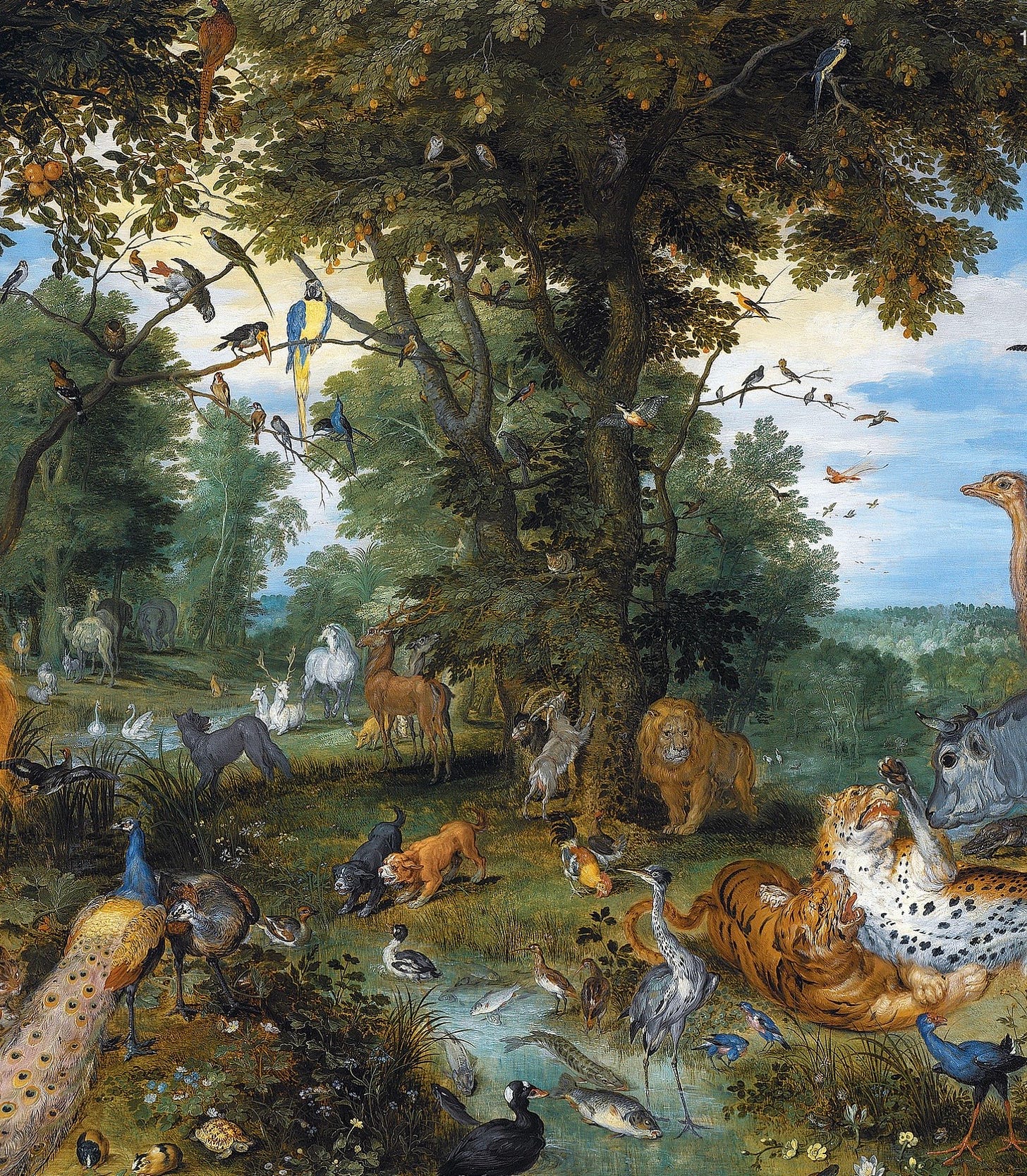
Book 4 lines 393 to 439 is our portion this week, a shortish 46 lines, where we watch Satan watching Adam and Eve, and then hear human speech for the first time.
I’m going to read it in two halves, and first comes Satan, who, last week, we’d seen arguing with himself about why he must push on with his project to ruin Adam and Eve, (God’s fault for humiliating him), despite, now having seen them, feeling he could pity, could love them, it must be done:
So spake the Fiend, and with necessitie,
The Tyrants plea, excus'd his devilish deeds.
Then from his loftie stand on that high Tree [ 395 ]
Down he alights among the sportful Herd
Of those fourfooted kindes, himself now one,
Now other, as thir shape servd best his end
Neerer to view his prey, and unespi'd
To mark what of thir state he more might learn [ 400 ]
By word or action markt: about them round
A Lion now he stalkes with fierie glare,
Then as a Tyger, who by chance hath spi'd
In some Purlieu two gentle Fawnes at play,
Strait couches close, then rising changes oft [ 405 ]
His couchant watch, as one who chose his ground
Whence rushing he might surest seize them both
Gript in each paw: when Adam first of men
To first of women Eve thus moving speech,
Turnd him all eare to hear new utterance flow. [ 410 ]
Those first two lines are Milton the political polemicist but also the theologian. Necessity, ‘the tyrants plea’, the got-no-choice/ this-is-going-to-hurt-but-I’ve-got-to-do-it, which Milton found unacceptable in everyone from the anglican bishops to the King and possibly, eventually, even in Cromwell. Perhaps sometimes, even in himself. But no time to worry about that quick aside - we must go on, with Satan, to be in the doing.
Times like this I love Milton, his imagination taking me by surprise and jolting me into new thought. Satan enters the bodies of the various animals we had previously seen close to Adam and Eve, flitting from one to another as best suits his desire to follow, to view, the human couple:
himself now one,
Now other, as thir shape servd best his end
Neerer to view his prey,
And so fitting that he should ‘become’ animal, as he seeks his -Milton using that beastly word - ‘prey’. Readers in the online group loved this big cat section, with one cat-loving reader suggesting Milton’s portrait might be based on domestic cat behaviour:
about them round
A Lion now he stalkes with fierie glare,
Then as a Tyger, who by chance hath spi'd
In some Purlieu two gentle Fawnes at play,
Strait couches close, then rising changes oft [ 405 ]
His couchant watch, as one who chose his ground
Whence rushing he might surest seize them both
Gript in each paw:
Just at that moment, when we are imagining Adam and Eve held one in each huge paw, something astonishing and almost miraculous happens: Adam begins to speak and Satan finds himself ‘all eare.’
Adam first of men
To first of women Eve thus moving speech,
Turnd him all eare to hear new utterance flow. [ 410 ]
Why, I wondered, the word ‘moving’ there? And why this very formal nomenclature? ‘Adam, first of men/first of women Eve’? Milton wanting us to see them - despite us having known them by hearsay all our lives - as beings we are seeing for the very first time? Milton wanting us to see them anew? To hear, like Satan, human language for the first time? Is it Satan who is moved by the human voice
Sole partner and sole part of all these joyes,
Dearer thy self then all; needs must the Power
That made us, and for us this ample World
Be infinitly good, and of his good
As liberal and free as infinite, [ 415 ]
That rais'd us from the dust and plac't us here
In all this happiness, who at his hand
Have nothing merited, nor can performe
Aught whereof hee hath need, hee who requires
From us no other service then to keep [ 420 ]
This one, this easie charge, of all the Trees
In Paradise that bear delicious fruit
So various, not to taste that onely Tree
Of knowledge, planted by the Tree of Life,
So neer grows Death to Life, what ere Death is, [ 425 ]
Som dreadful thing no doubt; for well thou knowst
God hath pronounc't it death to taste that Tree,
The only sign of our obedience left
Among so many signes of power and rule
Conferrd upon us, and Dominion giv'n [ 430 ]
Over all other Creatures that possess
Earth, Aire, and Sea. Then let us not think hard
One easie prohibition, who enjoy
Free leave so large to all things else, and choice
Unlimited of manifold delights: [ 435 ]
But let us ever praise him, and extoll
His bountie, following our delightful task
To prune these growing Plants, and tend these Flours,
Which were it toilsom, yet with thee were sweet.
Much to learn here about our Grand Parents (as Milton calls them in Book 1) and what they know. First, Adam is really in love with Eve and rates her the very best thing in all of Paradise (‘sole part of all these joys’, with OED offering that second ‘sole’ as meaning unrivalled). But while his attachment is strong, and his sense of God full of respect and good thinking, yet the bulk of his attention seems concerned with the prohibition against the Tree of Knowledge. We must wonder why.
Adam argues that God must be good because the creation and their existence here in Paradise is good:
needs must the Power
That made us, and for us this ample World
Be infinitly good, and of his good
As liberal and free as infinite, [ 415 ]
That rais'd us from the dust and plac't us here
In all this happiness, who at his hand
Have nothing merited, nor can performe
Aught whereof hee hath need, hee who requires
From us no other service then to keep [ 420 ]
This one, this easie charge,
It seems Adam is thinking in terms of potential reciprocation - but there is nothing they can do for God except the service of keeping the commandment, which he sees as a simple matter, ‘easie’ to perform.
This one, this easie charge, of all the Trees
In Paradise that bear delicious fruit
So various, not to taste that onely Tree
Of knowledge, planted by the Tree of Life,
So neer grows Death to Life, what ere Death is, [ 425 ]
Som dreadful thing no doubt; for well thou knowst
God hath pronounc't it death to taste that Tree,
The only sign of our obedience left
Among so many signes of power and rule
Conferrd upon us, and Dominion giv'n [ 430 ]
Over all other Creatures that possess
Earth, Aire, and Sea.
Adam’s sweet innocence (‘what ere Death is’) and his security in his place as the most powerful, all-ruling creature must be thrilling to Satan as he listens. What an opportunity. Readers were concerned by Adam’s concentration on the ‘easie charge’. Is is bugging him that they can’t do it, asked one . Or have we stumbled across them in the middle of a discussion about it? Is it?
This one, this easie charge, of all the Trees
In Paradise that bear delicious fruit
So various, not to taste that onely Tree
Of knowledge, planted by the Tree of Life,
So neer grows Death to Life, what ere Death is, [ 425 ]
Som dreadful thing no doubt; for well thou knowst
God hath pronounc't it death to taste that Tree,
The only sign of our obedience left
Among so many signes of power and rule
Conferrd upon us, and Dominion giv'n [ 430 ]
Over all other Creatures that possess
Earth, Aire, and Sea.
It’s the ‘for well thou knowest’ that makes me think of an ongoing conversation. That and the suggestion that there might have been complaint from Eve about the ‘easie charge’, which now becomes ‘one easie prohibition’:
Then let us not think hard
One easie prohibition, who enjoy
Free leave so large to all things else, and choice
Unlimited of manifold delights: [ 435 ]
But let us ever praise him, and extoll
His bountie, following our delightful task
To prune these growing Plants, and tend these Flours,
Which were it toilsom, yet with thee were sweet.
Had they, or had Eve, been finding that ‘easie prohibition’ hard?
Adam concludes by celebrating the freedom they have, turning happily back to Eve and the ‘delightful task’ they have on hand, of looking after Paradise. And of being together.
So what has Satan, in his animal disguise, learned of these creatures? That Adam is in deeply in love with Eve; that they are lords of all they survey; that there is only one rule; and that they may have been discussing that rule and its necessity before Satan arrived.
Next time we’ll hear what Eve has to say.
But - please note - next time is a little way off as I’m taking a two week break from Reading Paradise Lost. The next instalment will come out on Wednesday 7 May. Thanks for reading along with me.






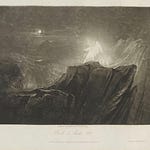
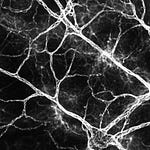

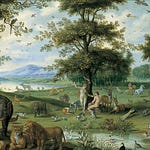
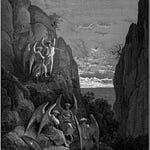
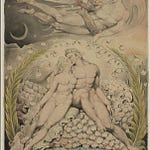
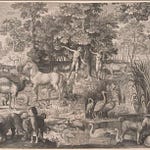
Share this post